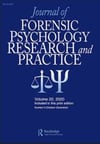The existing data on the pros and cons of using telehealth platforms to conduct forensic evaluations is reviewed. In addition, recommendations for future research and the continued use of teleconferencing, beyond the COVID-19 pandemic, are discussed. This is the bottom line of a recently published article in the Journal of Forensic Psychology Research and Practice. Below is a summary of the research and findings as well as a translation of this research into practice.

Featured Article | Journal of Forensic Psychology Research and Practice | 2021, Advance Online Publication
The Use of Videoconferencing in Forensic Evaluations: Moving Forward in Times of COVID-19
Authors
Abby L. Mulay, Medical University of South Carolina
Emily D. Gottfried, Medical University of South Carolina
Diana M. Mullis, Medical University of South Carolina
Michael Vitacco, Augusta University
Abstract
Severe acute respiratory syndrome coronavirus 2 (SARS-CoV-2), the virus that leads to the disease COVID-19, has resulted in significant challenges for the medical and psychiatric communities. Much like other clinicians during this global pandemic, forensic evaluators have been faced with the difficult task of continuing their clinical work, while helping to maintain the safety of their examinees, support staff, correctional personnel, and themselves. As such, the implementation of telehealth appears to be a viable alternative to in-person evaluations, but questions regarding the fidelity of these forensic evaluations remain at the forefront. The goal of this paper is to examine data relevant to conducting forensic evaluations using telehealth platforms. We offer both pros and cons of using telehealth videoconferencing to conduct forensic evaluations, so that the forensic evaluator may make an informed decision regarding whether they plan to utilize this technology. Additionally, we discuss considerations for training in the delivery of telehealth services. This paper concludes with a discussion of areas for future research, such as the examination of modifications practitioners have made to their practice and the reliability of forensic opinions conducted over telehealth. We end by suggesting telehealth is the path forward for forensic evaluation, regardless of public health status.
Keywords
Forensic psychology, forensic psychiatry, telehealth, videoconferencing, COVID-19
Summary of the Research
“As the novel coronavirus pandemic continues, commentaries have emerged regarding the use of forensic mental health…However, few studies have examined the utility of conducting forensic evaluations…using telehealth platforms…The goal of this paper tis to provide arguments for and against the use of telehealth platforms in forensic evaluations…” (p. 1-2).
“Regardless of the type of forensic evaluation…the safety and security of the evaluator always remains a concern…Other types of security may be compromised, in that if an attorney observes a forensic evaluation via telehealth platforms, there may be no way of ascertaining if the attorney is covertly recording the evaluation without the consent of the evaluator…conducting forensic evaluations via telehealth saves the financial costs associated with transportation and salaries of transporting officers…the use of telehealth may also increase access to qualified examiners, especially in rural or underserved areas…” (p. 6-7).
“Determining the logistics for conducting a forensic evaluation via telehealth also has its challenges…Overarching all of these issues is the question of whether the jail is amenable to these types of evaluations…Other logistical concerns for the forensic evaluator include the necessity to travel to conduct the evaluation via telehealth (e.g., a jurisdiction may require its evaluators to conduct the evaluations from the courthouse). Additionally, some psychologists may conduct computer-administered assessments in a testing center in a group…The need to remotely monitor an examinee who is taking the assessments in another location could therefore affect the revenue of the examiner…” (p. 9).
“Taken together, the limited research on the use of telehealth, our own observations of conducting forensic evaluations via telehealth, and careful analysis of potential pros and cons of using this technology for forensic evaluations, suggests that the benefits outweigh the limited concerns. The use of this technology during times of a national health crisis would appear to be the most ethical path forward. Even following the novel coronavirus pandemic, forensic practitioners might consider using telehealth platforms as a starting point for their evaluations…” (p.14).
Translating Research into Practice
“…a potential benefit of using videoconferencing is that an attorney’s microphone could be muted and their camera could be turned off after they greet their client. Thus, conducting the evaluation via telehealth could also ensure the attorney does not participate or attempt to verbally or nonverbally influence the results of the evaluation…Anecdotal concerns abound regarding concerns that forensic mental health evaluations conducted via electronic platforms would be more susceptible to feigning or defensive responding that could not be detected by the evaluator…several instruments designed to detect distortions in response style could be easily adapted for administration via telehealth platforms. Structured interviews like the Structured Interview of Reported Symptoms – 2nd Edition (SIRS-2; Rogers et al., 2010) and the Miller Forensic Assessment of Symptoms Test (M-FAST; Miller, 2001) would appear well suited for administration via telehealth, but not yet empirically tested (to our knowledge)…As a final caveat, there does not appear to be a prohibition against initiating a forensic evaluation via telehealth and conducting an in-person, in-depth follow-up if warranted…” (p. 6-8).
“Many individuals with paranoia and delusional beliefs incorporate technology into these beliefs (e.g., wiretaps, video monitoring). Therefore, the addition of telehealth technology may influence an examinee’s willingness to participate in the evaluation…if an examinee’s symptoms are exacerbated by the presence of technology, this data point could be utilized to possibly strengthen the position outlined in the forensic report. Subtle negative symptoms of psychosis may be unable to be appropriately evaluated via telehealth…” (p. 8-9)
“Training students on the use of telehealth should be integrated into higher education…The American Psychological Association (APA) has offered recommendations during COVID-19 for those who train and teach graduate students in psychological assessments…A unique benefit of using telehealth is the opportunity that it affords in both training and quality control. Specifically, a supervisor can observe the evaluation remotely and offer in-vivo supervision, quality control can be conducted by having peers observe a recorded evaluation, and the use of telehealth can provide simulation to trainees on a remote basis…prior to conducting a case over telehealth…The trainee should identify a point of contact…in the case of expressed suicidal or homicidal ideation with intent and/or plan, or in the event other crisis situations may arise” (p. 11-12).
“An important line of research would be to examine the attitudes of judges, attorneys, and juries regarding the use of videoconferencing in forensic evaluations, as preliminary research suggests legal professionals express a preference for in-person evaluations, as opposed to evaluations conducted over telehealth platforms…attitudes of jurors towards the use of videoconferencing in forensic evaluations is necessary. Some have suggested the use of videoconferencing negatively impacts the effectiveness of the expert witness…” (p. 13-14).
Other Interesting Tidbits for Researchers and Clinicians
“The American Psychological Association (APA, 2013) provides guidelines for the provision of psychological services over telecommunication platforms. These guidelines include competence…standards of care…informed consent…confidentiality…security/data transmission…testing/assessment…and interjurisdictional practice…Similarly, the American Psychiatric Association, in conjunction with the American Telemedicine Association, offer similar guidelines for the practice of telehealth…” (p. 3).
“…Regardless of setting, a forensic evaluator must be cognizant of nuances of an examinee’s behavior and statements and some critical data points could be lost when an evaluation is conducted over a telecommunication platform. For example, in considering the mental status examination, characteristics such as eye contact, grooming, and psychomotor activity have greater potential to be misconstrued if the evaluator is not in relative proximity to the examinee. In the cases of examinees with significant psychotic symptoms, the presence of technology may intensify feelings of paranoia, which may negatively impact the assessor’s ability to collect relevant data. If safety becomes a concern, the evaluator may not know the policies of the institution or who to contact to ameliorate the situation” (p.5).
Join the Discussion
As always, please join the discussion below if you have thoughts or comments to add!






















